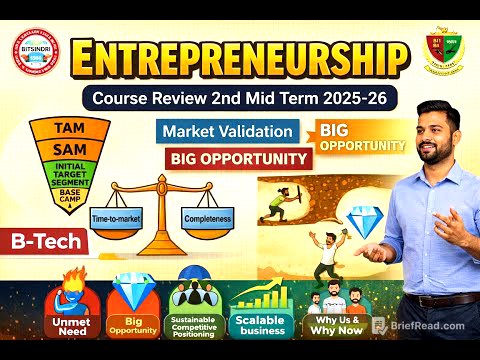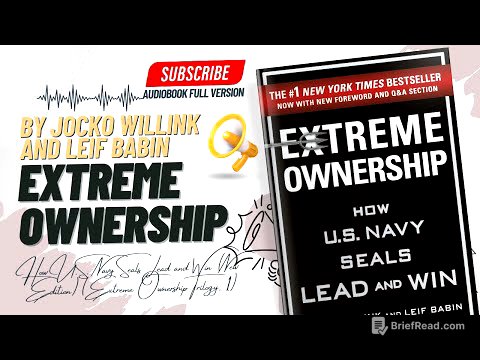TLDR;
This episode of the Master Income Podcast focuses on the critical importance of money management, arguing it's more vital than the amount of money earned. It highlights that financial freedom is attainable at any income level with proper management, contrasting it with high earners who lack freedom due to poor spending habits. The discussion covers practical steps for managing money, including tracking expenses, budgeting using the 50/30/20 rule, setting savings goals, and addressing debt. It emphasizes that managing money is a continuous habit, not a one-time fix, and underscores the need to change one's mindset towards money to achieve long-term financial well-being.
- Managing money is more important than making money.
- Financial freedom is possible at any income level with proper management.
- Key steps include tracking expenses, budgeting, setting savings goals, and addressing debt.
- Changing one's mindset towards money is crucial for long-term financial well-being.
Introduction: The Importance of Money Management [0:07]
The podcast introduces the concept that managing money effectively is more crucial than the amount of money one earns. It poses the question of whether someone earning a modest income can be financially free, answering affirmatively and emphasizing that financial freedom is accessible regardless of income. Conversely, it points out that even high earners can lack financial freedom if they mismanage their funds, highlighting the difference lies in understanding how to spend money wisely. The introduction sets the stage for discussing practical money management strategies.
The Case of the High Earner with No Savings [1:54]
The host shares a story about a consultation with a high-earning individual who, despite a substantial monthly income of 300,000 pounds, consistently ran out of money by the third week of each month. This individual's inability to manage his finances led to reliance on credit cards and borrowing. The consultant discovered that the client had no clear understanding of where his money was being spent. By tracking his income and expenses, they identified the problem areas and implemented solutions, enabling the client to save at least 100,000 pounds per month, demonstrating that the issue was not a lack of income but poor money management.
The Flawed Equation of Financial Freedom [4:23]
The host challenges the conventional equation for financial freedom, which states that income should exceed expenses. While acknowledging that having more income than expenses is generally positive, the host suggests this equation is oversimplified. Social media often focuses on increasing income through promotions, job changes, or new businesses, which requires significant personal effort. However, the host argues that decreasing expenses is an easier and often overlooked aspect of financial management.
Control and Discipline: The Etiquette of Money [6:19]
The discussion shifts to the importance of control and discipline in managing money, referring to it as the "etiquette of money." It emphasizes that having control over one's finances is essential, as uncontrolled spending can negate the benefits of increased income. The concept of "lifestyle creep" is introduced, where increased income leads to increased spending, preventing financial progress. The host stresses the need to avoid this trap by maintaining financial discipline and awareness.
Practical Steps for Managing Your Money [7:39]
The host outlines several practical steps for managing money, emphasizing that these are guidelines rather than strict rules. The first step is to "know your numbers," which involves tracking bank balances, assets, and debts. The host recommends regularly reviewing and updating this information, even daily, to stay informed about one's financial situation. The second step involves using an Excel sheet (link provided with the episode) to record all income, savings, and expenses, no matter how small. This detailed tracking helps identify where money is being wasted and allows for informed adjustments.
Budgeting with the 50/30/20 Rule [10:29]
The third step introduces the 50/30/20 budgeting rule as a method for allocating income. According to this rule, 50% of income should be allocated to needs (essential expenses like housing, food, and utilities), 30% to wants (luxuries and discretionary spending), and 20% to savings and investments. The host notes that these percentages can be adjusted based on individual circumstances, such as high household expenses or significant debt.
Prioritizing Savings and Setting Financial Goals [12:38]
The host advises to "pay yourself first" by immediately setting aside the 20% allocated for savings into a separate account. This prevents the temptation to spend those funds during the month. Additionally, the importance of setting a specific savings goal, such as saving a certain amount by the end of the year, is emphasized. Having a clear goal provides motivation and focus, encouraging individuals to reduce expenses and stay on track. The discussion also touches on the need for an emergency fund to cover unexpected expenses without dipping into savings.
Addressing Debt and Increasing Income [14:38]
The next step involves paying off all outstanding debts, as debt represents a significant expense. Reducing or eliminating debt frees up more money for saving and investing. Finally, the host addresses the importance of increasing income through various means, such as additional sources of income. However, it is crucial to first establish good money management habits before increasing income to avoid the pitfalls of lifestyle creep.
Changing Your Mindset: Money Etiquette and Habits [15:44]
The final step emphasizes the importance of changing one's mindset towards money, developing "money etiquette." The host argues that if you cannot manage a small income effectively, you will not be able to manage a larger income. Managing money should become a continuous habit, not a one-time fix. Regularly tracking expenses, reviewing finances, and adjusting habits are essential for long-term financial well-being. The host concludes by providing links to an Excel file and a video tutorial to help viewers implement these strategies.



![[Ida Jean Orlado] THEORY OF DELIBERATIVE NURSING PROCESS {REPORT 8}](https://wm-img.halpindev.com/p-briefread_c-10_b-10/urlb/aHR0cDovL2ltZy55b3V0dWJlLmNvbS92aS82TUd6TTJpQU9FSS9ocWRlZmF1bHQuanBn.jpg)





